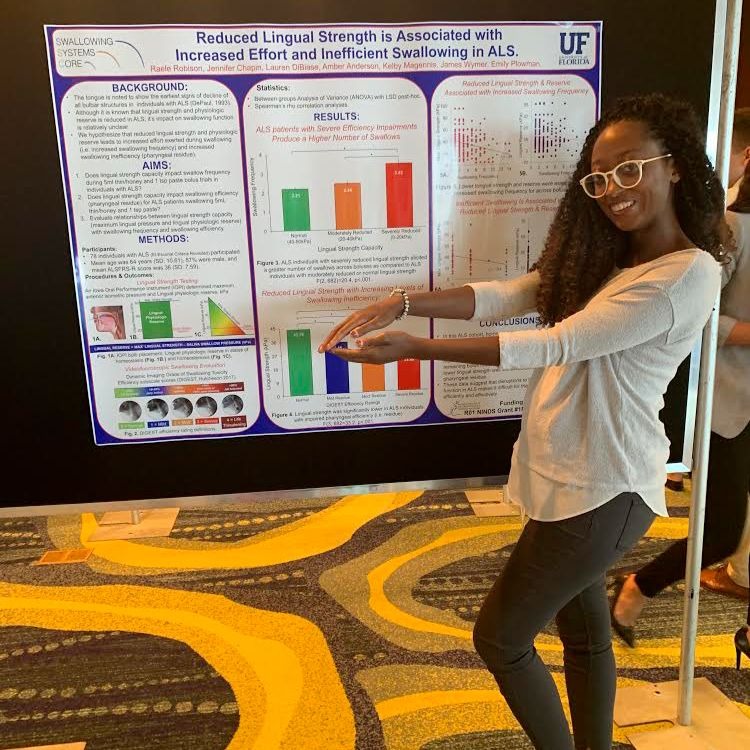Raele Robison
Madison, Wisconsin (United States)
RAELE ROBISON
Scleroderma Stories Issue 1

Could you please tell us about yourself?
I am originally from Bethlehem, Pennsylvania, which is affectionately known as the “Christmas City”. I moved to Florida in 2013 to pursue a masters in speech pathology at the University of South Florida and now am finishing up my doctorate at the University of Florida.
My passion is research, and I currently study swallowing disorders in people with ALS (or Lou Gehrig’s Disease). I will be moving to Madison, Wisconsin in March after I defend to research swallowing in Alzheimer’s and the frail elderly.
My hobbies include nature walks with my new puppy, Fred, and trying all different types of restaurants with my close friends!

What led to your diagnosis?
I was diagnosed in March of 2017. My symptoms started in April of 2016 with daily hand swelling. I went to see a primary care physician who then sent me for blood work. My antinuclear antibody (ANA) test came back positive, so she recommended I see a rheumatologist. I saw the rheumatologist in July, and he ran a whole bunch of tests that didn’t show anything. He told me to return in a year.
Between October and December, I had increased muscle aches, fatigue, and skin discoloration. I also noticed that my skin was really tight in some areas, leading to a reduced range of motion. In late December, I had trouble breathing that got progressively worse. By late January of 2017, my friends were driving me to class because I couldn’t walk ten steps without needing to catch my breath. I went back to see the rheumatologist, and he diagnosed me with scleroderma.
Then, in April of 2017, I got diagnosed with pulmonary hypertension and did one year of continuous IV therapy to treat that.


How did you feel after being diagnosed?
I was really scared after being diagnosed. I hadn’t heard of the disease before being diagnosed, and I read a lot of scary things about it after my diagnosis that made me feel really anxious and fearful.
How has this disease affected you?
Scleroderma has affected my entire life, as I am no longer the person I was before, either physically or mentally. I have to approach a lot of situations from a standpoint of “will I be able to do this?” whereas before I didn’t have to put much thought into it.
The biggest change has been my stamina levels. I get tired easily, so I have to structure my days in ways that allow for rest. Thankfully, my line of work is really conducive to my needs, so I’ve been able to make scleroderma “work” for me.
Do you experience any difficulties in completing tasks required by your research work?
The line of research that I conduct is more mentally demanding than physically, so I usually don’t encounter too many difficulties.
As I mentioned, a big obstacle for me is just energy, as I find I can only work maybe four to five hours per day. So, I try to structure my weeks (meetings, writing, etc.) to accommodate my energy levels.
What kinds of doctors have you seen, and what medical workups and treatments have you had?
I have seen a dermatologist, rheumatologist, two GI specialists, and pulmonary hypertension specialists. For rehabilitation, I work with an occupational therapist, a massage therapist, and two physical therapists (one who does manual manipulation therapy and one who focuses on TMJ* for my reduced mouth opening).
*TMJ stands for temporomandibular joint dysfunction
Previously, for my pulmonary hypertension, I was on a continuous IV therapy called Veletri. I transitioned off of that in 2018 to Uptravi. Since my PH diagnosis, I have also taken Opusmit and Adcirca. For scleroderma, I take Cellcept.
I have had a lot of tests and procedures done, including right heart catheter, chest x-rays, hand x-rays, pulmonary function tests, six-minute walk tests, and a whole bunch of blood work that I do monthly for the Cellcept.

What treatments have you found most helpful?
The Veletri medication definitely saved my life – I truly believe that. Outside of medicine, definitely working with my physical and occupational therapists has been the most helpful. I have myositis associated with my scleroderma, and they’ve really helped me regain some of my physical function and range of motion.

What advice do you have for those with scleroderma or other chronic illnesses?
I would say my biggest piece of advice is to take charge of your story.
When you have an illness, I think it’s easy for people to place you into a box of what you can and cannot do, and the disease starts to dictate your life. But, I think all of us living with a chronic illness should feel empowered to change the narrative and show the disease what we are capable of.
Be sure to follow us on Instagram and Facebook (@sclerounited) to see more scleroderma warriors’ journeys in our weekly Sclero Sunday series.
Are you a scleroderma warrior? We’d love to interview you for Scleroderma Stories! Please visit tinyurl.com/share-my-sclero-story or email us at contact@sclerounited.us
